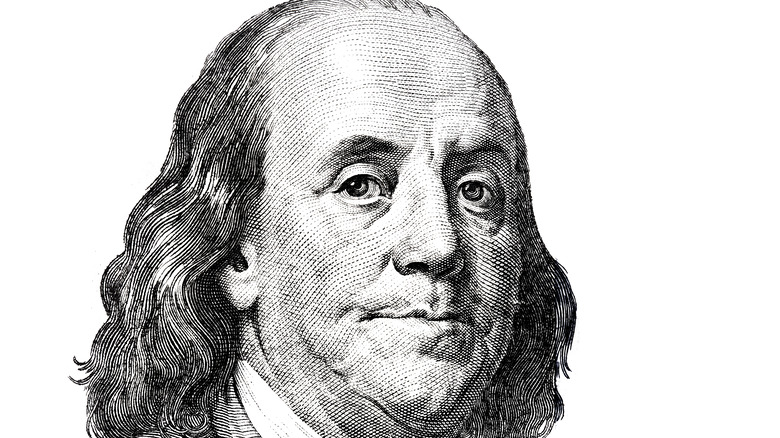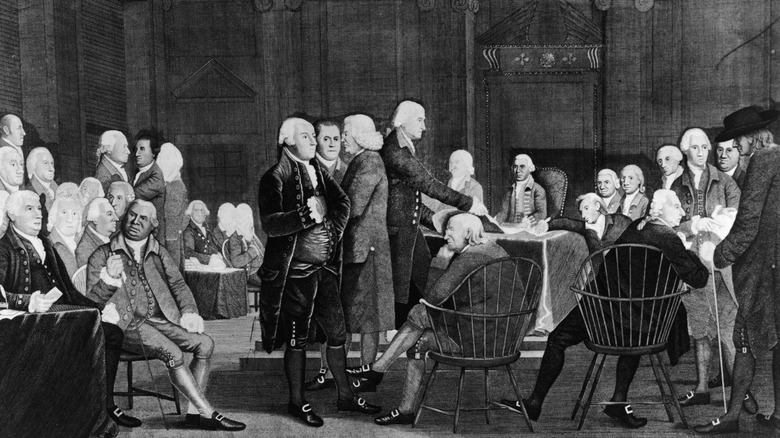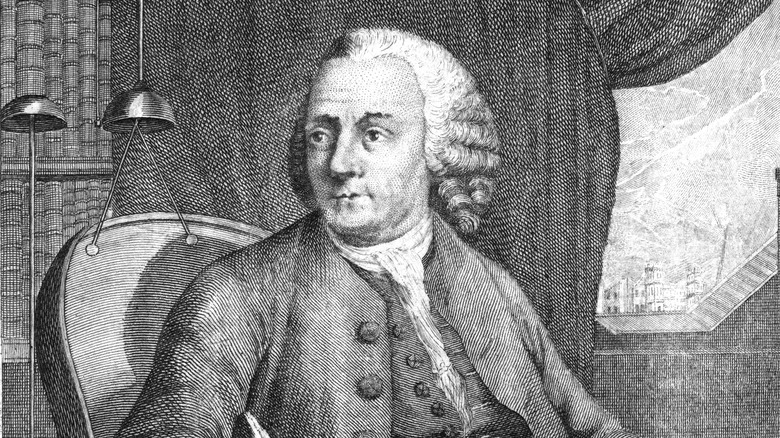Why Many Believed Benjamin Franklin Was Actually A British Spy
Benjamin Franklin is associated with many titles — inventor, Founding Father, writer, printer, postmaster, and publisher. But, what about British spy?
Whispers of the possibility circulated before the American Revolution. After all, Franklin had supported King George III, and he reluctantly joined the Founding Fathers' stance to advocate for a separation from Britain, according to History. Franklin, who had lived in London for many years, initially wanted to see the empire preserved. He remained the head of the American postal system — a royal-appointed position — and hoped to become the first Pennsylvania governor under the same system. He wrote about his more centrist viewpoint, cautioning his more radical contemporaries that, "every mistake in government, every encroachment on rights is not worth a rebellion" (via Ranker).
He also called the Boston Tea Party — a political protest against "taxation without representation" on December 16, 1773, that destroyed imported tea (via History.com) — an "act of violent injustice on our part" in a letter to Founding Fathers Samuel Adams and John Hancock, among others. Franklin even went so far as to state that the East India Company should be paid for its losses since the business was not an adversary and the "offensive measure of sending their teas did not take its rise with them, but was an expedient of the ministry to serve them and yet avoid a repeal of the old act" (via Franklin Papers).
A war between father and son
By the time Benjamin Franklin participated in the Second Continental Congress in 1775, his perspective changed. At first, though, he kept his opinions about independence to himself. Other delegates debated the topic during sessions, committee meetings, and even in taverns during the evening. His silence mystified John Adams, who wondered why Franklin was so revered if he just continued "sitting in silence, a great part of the time fast asleep in his chair." Other, younger delegates, who knew he had addressed Parliament against the Stamp Act, began to think that the silence might mean something else — he still held an allegiance to Britain (via Smithsonian Magazine).
One of the reasons Franklin stayed quiet, even after the battles in Lexington and Concord, was family. His son William Franklin, an ardent loyalist who was a royally appointed New Jersey governor, argued with his father about America breaking away from England. Franklin looked at William as a confidante and hoped to win him over. But William remained obstinate when the two met during the summer of 1775 and told Franklin that he would "set the colonies in flame" if he pursued support of the revolution. Shortly after, Franklin would publicly proclaim his support for the cause. The two never reconciled. William spent two years in a colonial prison and then fought alongside the British until the battle of Yorktown and then traveled to London. His father disinherited him, and William never returned to America (via Ranker).
Agent 72 - a Franklin alias?
Once Benjamin Franklin supported the revolution, much of the spy gossip ceased, but some historians still wonder if the talk contained some truth. After all, espionage was common during the Revolutionary War, with both the American and English sides yearning for top secret intel on troop movement, battle strategy, and other tidbits. Franklin's own son, William, even gave the British details about his father's actions (per PBS). A colleague of Franklin's, Edward Bancroft, the American delegation secretary, also offered information about the American activities, including discussions and meetings, to Great Britain. Additionally, Franklin participated in the Committee of Secret Correspondence in 1775, a creation of the Second Continental Congress and a precursor to the CIA.
Some also believe Franklin served as "Agent No. 72" for the British Secret Service, and that he worked with Bancroft as a double agent, feeding him secrets about the Americans and their plans (per Argosy Magazine). But evidence for this is not conclusive.
After hearing Bancroft was a spy, Franklin did once say, "If I was sure, therefore, that my valet de Place (Bancroft) was a spy, as probably he is, I think I should not discharge him for that, if in other respects I liked him," according to HistoryNet. Of course, that statement doesn't prove Franklin's status as a spy, perhaps he was just giving Bancroft fake information or using him to gain details for the revolution? We may never know.


